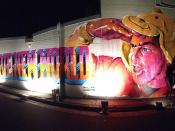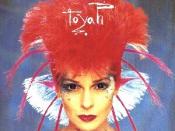"While the State exists, there can be no freedom. When there is freedom there will be no State," (Lenin). Using Marx's writing, Lenin argues that freedom1 is detrimental to society; that society cannot function with freedom. This same quote could have been said by Mustapha Mond, leader of Aldous Huxley's totalitarian society created in his Brave New World. His society resembles that of Orwell's 1984; both involve the absolute control of society by the political authority, suppressing and perhaps eliminating individuality. As shown in The Butterfly Revolution, a certain amount of authority is often necessary to assure sanity in a society, but the appropriateness of the authority is determined depending on the differences among societies. This society's motto is "Community2, Identity3, Stability4," (3); the entire society revolves around these three words. The ultimate goal of the society is stability; any sort of change is resented and all sorts of preventions against change are made.
Here a diminished concept of identity as we define it today is seen, while a different sort of identity is introduced. No longer does an person possess any sort of individuality; one is simply a manufactured part for this machine of society. On the same note, the concept of community is altered; rather than an individual simply having a place in a group, the individual is no longer even existent, as one belongs to everyone else. In Huxley's fictional society, a dramatic change from today is seen; he creates a world in which all concepts valued today are nonexistent and freedom is virtually eliminated by the ultimate authority of the society.
Conjointly with the elimination of freedom, individuality disappears from this new society. Every member of the "brave new world" has a predetermined fate from the moment of his/her conception, unable to escape the path plotted...


